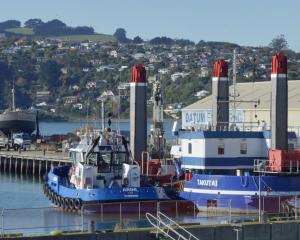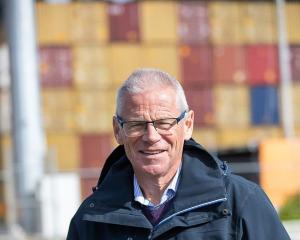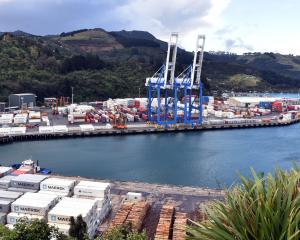A lack of good, solid information on the effects of Port Otago's proposed channel widening or deepening is concerning those who live and fish in, and care for, the area's environment.
The sixth day of Port Otago's resource consent hearing began yesterday with submitters expressing their concerns about the impact on Otago Harbour's environment.
Karitane fisherman and tourist operator Allan Anderson said he was most concerned about the impact of "fines" (silt and fine sedimentation) smothering habitat and the lack of knowledge about the effect of the dredging process.
"I don't think they know how far afield this stuff will go.
"It's not going to go away in five minutes or two or three years. It'll be there for a long time."
It took about six years after the flooding of 1980 for the fish stocks to recover from the sedimentation created in that event, he said.
Sedimentation was already affecting the east coast and "any more would be too much more, the log that breaks the camel's back".
Otago Peninsula, the harbour and east coast were a very special place and any loss to that environment was "way too high a price for us to pay".
Forest and Bird Dunedin branch chairwoman Janet Ledingham said the surveys undertaken on behalf of Port Otago on birds feeding in the affected areas were inadequate and needed to be carried out over a much longer period.
"Rigorous baseline seabird monitoring should be carried out prior to any dredging and mitigation procedures to minimise effects on seabirds, fish and marine mammals, including penguins."
Forest and Bird acknowledged the draft of Port Otago's management plan addressed many of its concerns, especially about the impact on Aramoana's ecological area and salt marsh.
Ornithologist Derek Onley, on behalf of Forest and Bird, said the sea off the Otago coast in and near the disposal site AO was important to a wide range of internationally significant birds - 34 species of seabird had been recorded in the area.
"Data on these birds' ecology and habitat is inadequate to make informed projections on the effect of disposal and dredge material at AO."
That differed from Port Otago's specialist, who had identified 14, he said.
"I can only conclude that the applicant's research was far from rigorous and lacked local knowledge of the site."
Given the unknowns, he considered there was no basis to conclude that the effects on birdlife would be minor or catastrophic, he said.
"In fact, I suggest the data on all fronts is inadequate to predict anything."
St Martin Island Community vice-chairman Dr Chris Brown said the community was concerned about potential sedimentation leading to stranding problems at Quarantine Island's mooring and turbidity causing problems for its educational programmes.
Friends of Otago Harbour spokesman Dr Richard Reeve said the group believed there was a lack of scientific certainty about the effects of the project.
If the application was granted, it wanted robust conditions, possibly supervised by outside authorities such as Doc and the University of Otago marine science department, plus wanted baseline data established in advance.
Prof Sir Alan Mark said Aramoana, recognised as one of the country's most important salt marsh ecosystems, was extremely vulnerable to siltation : "This ecosystem including its wildlife, must not suffer environmentally as a result of this major activity in its vicinities," he said.
He was satisfied consent provisions should be adequate to deal with those concerns and agreed with the additions requiring bird-life monitoring and establishing a working party.
Another condition providing for an ability to review conditions within three months of the start of the consent was crucial, as was monitoring of the godwit population.
Panel: John Lumsden (chairman), Hugh Leersnyder, Dr Mike Johnston.
Proposal
• Upgrade channel berth and swinging areas disposing 7.2 million cu m at sea.
• Extend multipurpose wharf by 135m.
• Construct fishing wharf at end of Boiler Pt walkway.
Where: Otago Regional Council, Dunedin.
Day 6
Submitters begin evidence.
Giving evidence yesterday: Forest and Bird Dunedin chairwoman Janet Ledingham and ornithologist Derek Onley, Alan Middleditch, Karitane fisherman and tourist operator Allan Anderson, Careys Bay resident Joe Cecchi, University of Otago marine science department head Prof Gary Wilson, Aramoana League president Bill Brown, Careys Bay resident Philip Murphy, Friends of Otago Harbour Dr Richard Reeve, St Martin Island Community vice-chairman Dr Chris Brown, Emeritus Prof Alan Mark.
Quote of day"
"I can only conclude that the applicant's research was far from rigorous and lacked local knowledge of the site" - Ornithologist Derek Onley.





